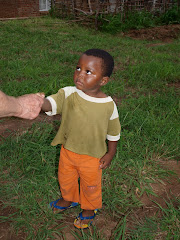The Dark Reality: The life expectancy of a woman in
Zimbabwe is 33 years old.
What is AIDS?
IMMUNE: HIV attacks the immune system. The word “immune” speaks of protection or defense.
DEFICIENCY: There is a deficient, inadequate, or “less-than needed” response to all diseases by the immune system.
SYNDROME: Any syndrome is just a group of signs and symptoms. When a person has AIDS, there is a group of signs and symptoms that point to that fact.
A person on ARVs - antiretroviral drugs can live for many years. However, in Africa only about 5 ARVs out of about 12 products world-wide are effective. Apparently, this is because people in Africa are not consistent in their use of ARVs and many of the drugs are now ineffective.
When people die of AIDS - what does that mean?
AIDS is only a description of the syndrome related to HIV. A person infected with HIV usually dies of some other opportunistic disease. HIV weakens and destroys the immune system so that the body cannot resist other diseases such as Malaria, Tuberculosis, Pneumonia or any other life threatening illness - even viral induced cancers. Further, HIV/AIDS renders a person tired and weak so that they tend to neglect nutrition and hygiene. They no longer have the energy to work in their gardens and in their homes or live productively in society.
What are some of the keys to
living positively with HIV?
ARVs - people with HIV need good medication and medical attention to combat HIV and other opportunistic diseases.
Nutrition - people with HIV need to have good nutrition in their diet. Further, nursing infants need to have supplemental milk from another source than their mother.
Attitude - people with HIV need to have a good outlook on life.
Transparency - all HIV carriers need to be open and transparent for any of the solutions above to be effective. Today, there is still much stigma about carrying HIV and still much bad information. In short, people live negatively and live in denial about HIV. This prevents them from getting good treatment, it allows them to potentially spread the infection, and prevents them from getting good spiritual, physical and emotional council.
What can the church do?
The church is strategically positioned to assist families and individuals in every area of their lives. More importantly, the church can introduce a person to Jesus Christ who transforms them from the inside out and gives them a purpose for living positively. This blog is dedicated to the churches who are in the battle. It is exciting to see individuals ignite the church in Zimbabwe to offer real help. These churches are offering help for the physical crisis of today but also offering help for HIV of the soul - which is more deadly than any other form of HIV.







